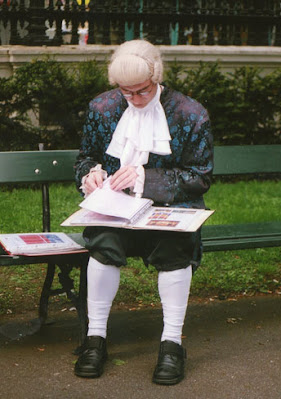Take a look at the Highs and Lows of Work with my contribution to this month's Sepia Saturday prompt of "Work".
Two Men at work in Rhymer's Mill, (tweeds) in Earlston in the Scottish Borders, early 1900s.
Rhymer's Mill in its rural setting in Earlston, closed down in 1969.
Steeplejacks
working on the mill chimney at Rhymer's Mill, Earlston. You get a sense of the height of the chimney from the
picture above.,
John William Oldham, my cousin's ancestor, sitting high on one of the carriages in the family business of Carters and Coalmen in Blackpool, Lancashire. The adverts on the wall include one for Mcdougall's flour and for a performance of Mendelssohn's oratorio "Elijah" on the North Pier.

Arthur Stuart Ingram Smith
(1908-1979)
was my cousin's father, here emerging from down under a manhole
cover, during his work as a linesman for the General Post Office in
Blackpool, Lancashire.

Sitting down is my grandfather William Danson (1885-1962) of Poulton-le-Fylde, Lancashire. He worked as a general labourer at the ICI (Imperial Chemical Industries) Works at nearby Thornton,. Was there a reason why he was given pride of place here?
Some 50 years later, my brother, William's grandson, was working in the oil industry.


Sheep shearers, hard at work in Earlston
My great great grandfather, Robert Rawcliffe of Hambleton, Lancashire was a Carter - an essential occupation in transporting farmers' goods around. But it had its risks.

One
such report was on the death on November 27, 1860 of Earlston grocer,
Alexander McWilliam who was making his rounds, selling to customers and
collecting produce from farmers, when he slipped and fell from his car.
He sustained head injuries and died at home. He was just 36 years
old and left two young children and a heavily pregnant wife.
My own great, great grandsfather Henry Danson of Poulton le Fylde , Lancashire, described in a report as a "expert in horse flesh" was ironically killed in a horse and cart accident in 1881.


Tommy Roger, a coracle maker, born c. 1845, Ironbridge, Shropshire -
My father John Weston
grew up in Broseley on the other side of the River Severn from Ironbridge, and
this photograph was found in the collection of his older brother Fred Weston.
You
might be wondering, what is that on his back? It is a coracle - a small, lightweight boat
with a loosely woven frame traditionally covered in animal hide, but in
more recent times calico, canvas and coated with a substance such as
bitumen. When
the famous Iron Bridge was opened in 1779, locals objected to paying the tolls,
so they used their coracles to cross the river instead.
Tommy Roger was
well known as a poacher and the local newspaper reported his
appearance in court on poaching charges. He also helped to build the
new police cells and court room in Ironbridge in 1862 - only to be one
of the first people to use them!
Taking a break:
My husband's father, a painter and sign-writer having a lie down
after a busy day's work.

Taking a break, or perhaps learning his lines - this costumed city guide in Vienna. Austria.

Down tools for these Greek workmen, taking a break - my husband encountered this group whilst on holiday in
1971 and when he took a photograph, they wanted some money!
With thanks to the Auld Earlston Group for the loan of the Earlston images.
*********************
Sepia Saturday gives an opportunity for genealogy bloggers to share their family history and memories through photographs.

Click HERE to see other bloggers at work.
******************





Such a wonderful wide variety of photos matching the theme this month including so many family members from all sides in so many different lines of work. And there's a "snap" between you & me with your father-in-law being a painter & sign-writer. My maternal grandfather was a talented sign painter! I didn't know that until recently. I knew we had quite a bit of artistic talent on my father's side of the family, & now I know we had some from my mother's side of the family as well. No wonder we're all, to some degree, artistic - including our son & daughters. They also inherited artistic talent from their paternal grandfather & an aunt who majored in art in college. :)
ReplyDeleteSo many different kinds of work and all have their challenges.
ReplyDeleteSusan
THose are great photos of men at work...a lot of industrious pursuits! No women workers though...
ReplyDeleteThanks for another interesting post using this theme of work. Manual laborers (or labourers) have always made interesting subjects for photographers but most never expected that the work would change or even disappear in a lifetime. I doubt if many children living in Earlston today would know how tweed was made, and probably most would not recognize tweed either. I'm always impressed by how many jobs or work in the olden times required a horse as a partner. The working relationship humans once had to an animal is vastly different to how we interact with tractors, machines, or computers in our modern time.
ReplyDeleteImpressive collection of work-related photos!
ReplyDeleteThank you all for your positive comments - I am enjoying contributing and reading the varied posts on this month's theme.
ReplyDelete